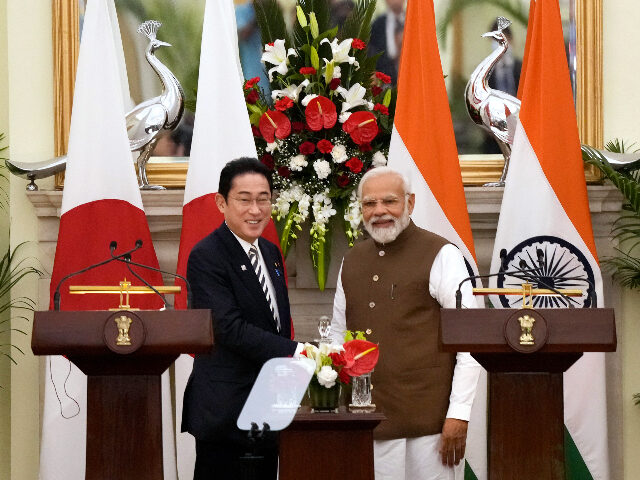Indian Prime Minister Narendra Modi welcomed his Japanese counterpart, Kishida Fumio, to New Delhi on Monday to discuss economic and security cooperation, timing the diplomatic event simultaneously with Chinese dictator Xi Jinping’s visit to Russia.
Xi landed in Moscow on Monday, greeted by Russian leader Vladimir Putin and expected to discuss both trade and China’s potential goal in the ongoing Russian invasion of Ukraine. Communist China is one of Russia’s closest international allies but also maintains close commercial relations with Ukraine and has refused to enthusiastically endorse the invasion.

Russian President Vladimir Putin, left, gestures while speaking to Chinese President Xi Jinping during the Shanghai Cooperation Organization (SCO) summit in Samarkand, Uzbekistan, Sept. 16, 2022. China said Friday, March 17, 2023, President Xi will visit Russia from Monday, March 20, to Wednesday, March 22, 2023, in an apparent show of support for Russian President Putin amid sharpening east-west tensions over the conflict in Ukraine. (Sergei Bobylev, Sputnik, Kremlin Pool Photo via AP, File)
India’s relationship with China has deteriorated dramatically in the past decade, largely as a result of China increasing its military presence on their mutual border and repeatedly invading the Indian Himalayan region. India’s top diplomat, External Affairs Minister S. Jaishankar, transparently stated in February that his country’s “relationship with major powers is good. China is an exception.”
In contrast, India and Russia have long maintained close ties. India has greatly increased its support of the Russian economy through purchases of cheap Russian oil since the full-scale Ukraine invasion began and is one of Russia’s top buyers of military hardware.
Japan has deeply unfriendly relations with both China and Russia. Japan and Russia are technically at war, as neither side signed a peace treaty following the end of hostilities during World War II. The lack of resolution on dispute over the Kuril Islands, north of Japan and east of Russia, has prevented the two sides from signing a peace deal. Japan is actively and loudly supporting Ukraine’s efforts to eradicate the Russian presence on its soil.
China’s poor relationship with Japan also dates back to World War II, during which Imperial Japan engaged in a host of human rights atrocities against the Chinese, killing millions. Those events occurred prior to China becoming a communist nation in 1949 and modern tensions are more directly related to Japan’s close alliance with the United States. Japan has dramatically increased its defense spending in the past decade in response to Chinese belligerence, including a recent threat to turn Japan into “the Ukraine of East Asia.”
Kishida’s visit to India began on Monday and will last three days. It will largely consist of planning for the G20 summit, which India will host this year, and the G7, which Japan is hosting. Modi and Kishida began their exchanges by accepting mutual invites to both events.
Modi touted the increasing closeness of their two countries in remarks following Kishida’s arrival, praising the positive “momentum” as having the potential to improve the world.
“In the last one year, PM Fumio Kishida and I have met several times and every time I’ve felt his positivity and commitment to the India-Japan bilateral relationship. His today’s visit will be beneficial to maintain this momentum,” Modi said, shortly before the two made a visit to pay homage to Mahatma Gandhi.
Kishida delivered an address on Monday discussing his vision for the “Indo-Pacific,” a term used to encompass much of the area surrounding the South China Sea, in which he pledged over $75 billion in infrastructure and security development for the region.
“I believe we should aim for a world where diverse nations coexist and prosper together under the rule of law without falling into geopolitical competition,” Kishida said, calling India “indispensable” to peace and development in the region.
“Peace is [paramount]. The principles such as respect for sovereignty, territorial integrity and opposition to unilateral changes to status quo by force must be followed,” Kishida asserted, according to the Deccan Herald, an Indian newspaper. “The principles should be adhered to in every corner of the world.”
The Japanese outlet Nikkei noted that Kishida warned in his address of “a big balance of power change” on the world stage that threatened the freedom and sovereignty of nations, sowing “division and confrontation,” and suggested that “quality infrastructure development” could help combat the nefarious influences.
Kishida did not mention China by name, according to reports translating his Japanese-language address, but his warnings appeared largely directed at China’s attempts to colonize the territories of neighboring countries and erode sovereignty through debt. On the former issue, China claims most of the South China Sea, a sprawling body of water that includes the territories of Taiwan, Brunei, Malaysia, Vietnam, and the Philippines. China also maintains bitter territorial disputes with Japan in the East China Sea and India in the Indian territories of Ladakh and Arunachal Pradesh, bordering occupied Tibet and East Turkistan.
Kishida’s investment in infrastructure appears to be intended to contain the Belt and Road Initiative (BRI), China’s global infrastructure development project. Through the BRI, China offers predatory loans to poor countries to be used to pay China for expensive infrastructure projects. When the countries inevitably fail to pay back the loans – as happened most prominently in Sri Lanka, a critical security region for India – China seizes the projects in question, granting the Chinese government a foothold in that territory.

COMMENTS
Please let us know if you're having issues with commenting.